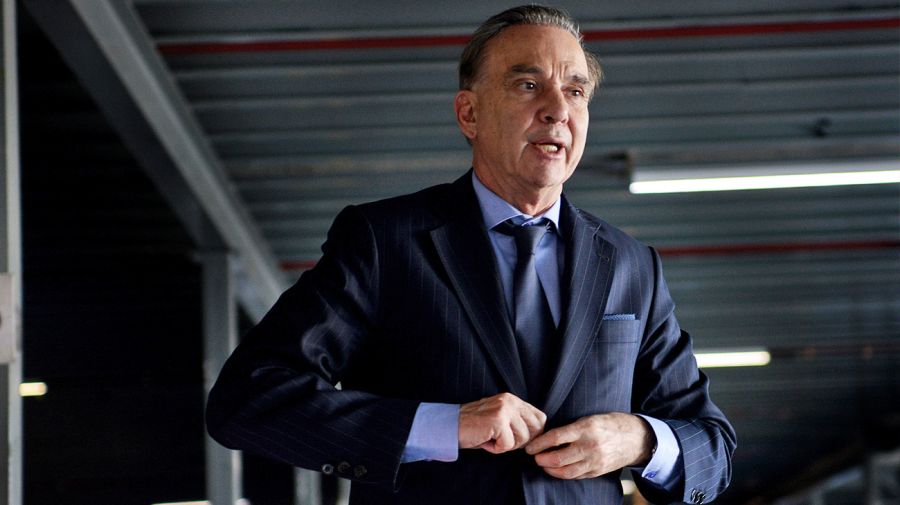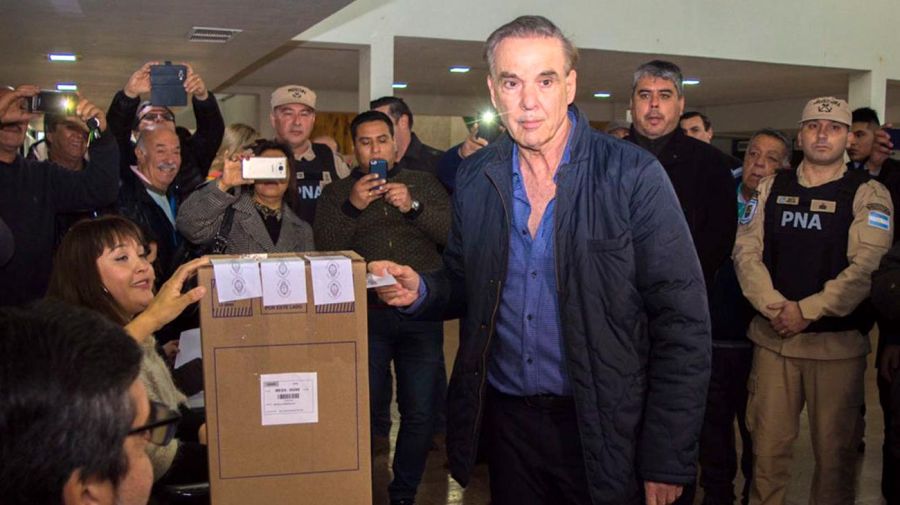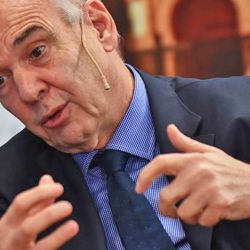Miguel Ángel Pichetto knows Peronism as nobody else does. In a period with ever more Justicialists in the opposition ranks, he analyses Argentina’s reality: the future of Alberto Fernández in the various post-November scenarios, the roles of Cristina Fernández de Kirchner and Mauricio Macri, the Juntos primary. He considers that the election will be defined symbolically in Buenos Aires Province.
What is the role of Republican Peronism today within the structure of Juntos por el Cambio?
An important role – containing and convoking the many Peronists with a centrist, national, republican and democratic vision, many comrades disappointed with how this government has worked out, people who gambled on a vote for the Fernández-Fernández ticket hoping for economic improvements.
There is something very important to construct which took its first steps between 2015 and 2019. That political construction called Alternativa Federal had very important leaders, such as Córdoba Governor Juan Schiaretti, [current Lower House Speaker] Sergio Massa, [Salta ex-governor] Juan Manuel Urtubey and myself, the founding panel and also many governors. It implied a process of democratic change and a more centrist outlook within Peronism. Unfortunately, that change did not happen.
PRO also had a Peronist wing, even before Cambiemos and Juntos por el Cambio – with Francisco De Narváez and Felipe Solá in the 2009 elections and in 2013, Sergio Massa. Will Republican Peronism institutionalise what was previously tactics as something permanent?
At this stage we are trying to give it an institutional framework with a party nationwide. We’ve constructed the party Alternativa Republicana Federal, more advanced in some places and with more difficulties in others. Assembling a serious party implies card-carrying members, a complex task.
I think it has a level of institutional consolidation within a certain fragility for parties, given the inevitable path towards coalitions in Latin America and also in Argentina. We are seeing a major polarisation between two grand coalitions – one centre-left and the space occupied by Juntos por el Cambio, which for me has to be centre-right. An unresolved debate within Juntos por el Cambio.
Paradoxically, both the Radical Facundo Manes and PRO’s Diego Santilli have Peronists among their main associates, Joaquín de la Torre and Emilio Monzó with the Radicals and Santilli himself with your support in PRO.
I couldn’t be anywhere else other than close to PRO, the party which invited me to become part of the Juntos por el Cambio coalition. Since I’m not a leaf in the wind, I think I should stay put and not go jumping from one side to the other, losing credibility. You have to be constructing a world of ideas, transmitting them to society. The Juntos por el Cambio label is not enough, needing a combo of ideas to generate expectations, in the immediate term for the parliamentary elections but alluding to the future.
I have great respect for De la Torre, who’s a pal. I understand his decision, based more on the immediate future of the Province than the present. It seems positive to me that a figure like Facundo Manes should start his political activity bidding for a Congress seat at the head of a list.
In a previous interview in this series you said something telling, that, following the “Baglini theorem,” [the closer to power, the less extreme] the La Cámpora kids would in time come to be social democrats.
Or more Peronist, also a logical outcome. Being Peronist implies interaction between the worlds of capital and labour. [Juan Domingo] Perón was never addicted to socialist or Communist ideas. His world and his politics were centred on the worker as conceived by the existence of companies. The harmonisation of capital and labour was the Peronist proposal, according to Perón.
That idea of “as much market as possible and as much state as necessary” would be characterised as social democratic in Europe and as Peronism in Argentina. So are you saying that some of the La Cámpora people are trending towards the centre?
That’s inevitable if they want to construct a project of political power. That intention has been made manifest. They need to update their ideas because their predominant ideas are old, as international relations demonstrate. Their very erratic politics do not help them for the future. Argentina’s true debate is between capitalism and ideologies glorifying poverty. They will have to have a more modern vision of a capitalist country with value-added resources, mining, oil, gas, agri-business – things which do not belong in a country glorifying poverty.
Is “poverty versus capitalism,” perhaps better defined as “populism and anti-populism” and “Peronism and anti-Peronism” already behind us, with Peronists in both coalitions?
I don’t see that grieta rift today either, it’s more between the present and the future of Argentina. If the productive sectors are encouraged, this would end that sterile debate of the hyper-environmentalists, who consider mining a tragedy, which also stems from the encyclical Laudato Si, which marks the road for many priests to say: “Watch out for mining” from their pulpits.
We should follow the example of Canada; if not, we’ll miss out on opportunities. The lithium opportunity is being lost amid these debates over whether to mine or not. The possibility of mining gold and silver in Patagonia is in the steppes, not Esquel, Bariloche or Villa La Angostura, not in places where the water table is contaminated, but in the desert. What is happening in Chubut is inexplicable with the [provincial] government owing its workers three months of wages when it has one of the richest silver mines in the world, Navidad, in the Gastre plateau, with no risk of pollution. The state’s duty is to mine, create jobs and look after the environment. Canada could do it and Argentina cannot. It’s stuck in this kind of debate where Church participation is negative.
In this same series of interviews, Pablo Gerchunoff said that in reality there have been only two political organisations [in Argentina] – the Radicals and La Cámpora. Will all Peronism at some stage turn into La Cámpora?
Peronist youth today is interpreted by La Cámpora and by a progressive left with an almost romantic perspective of a non-existent past. But Peronism does exist. I disagree with Gerchunoff, whom I respect greatly, but there is a Peronist unidad básica cell in every town just as there is a [Radical] comité.
Does La Cámpora co-opt that?
Not in the provinces. La Cámpora walks very tall in Buenos Aires Province. In the third electoral section [Southern Greater Buenos Aires] there is a substantial advance but in the rest of the country it has to co-exist with the organic structure of the PJ [Partido Justicalista] and the governors, who are very deeply rooted with a more centrist Peronist vision.
Will that Peronism end up in Juntos?
That Peronism is starting to manifest a certain autonomy, very interesting. For example, the decision taken by the Governor of Córdoba [Juan Schiaretti] to run his own list of senatorial candidates in this year’s midterms, along with his links with [Santa Fe’s] Omar Perotti. They are productive provinces where the worlds of business, labour, farming and cattle-raising have received negative responses from the Alberto Fernández government such as the beef export ban and the attempt to nationalise Vicentin.

Will [ex-minister] Florencio Randazzo and [ex-governor] Juan Manuel Urtubey end up in Juntos or will the current Frente de Todos alliance between La Cámpora and traditional Peronism break up?
Both Juan Manuel and Randazzo have greater affinity with that universe of ideas. You need to understand Peronist genetics to avoid false constructions. Today most Peronists are in Frente de Todos because they’re in power. Peronism is a party of power, which beyond doubt attracts, subordinates and disciplines...
And seduces ...
Peronism will run a single list in Buenos Aires Province without primaries and will try to unify its lists nationwide, giving battle to defend power. A defeat could start to expose some fragility or even crises when provincial leaders have to face their electorates. Córdoba, Santa Fe, Entre Ríos, San Juan and San Luis are all productive provinces, along with Patagonia where Neuquén, Río Negro, Santa Cruz and Chubut all produce oil and are thus linked to private-sector interests. At some point they have to act in self-defence.
Pablo Gerchunoff also observed: “I don’t know if Juntos por el Cambio has moved towards the middle, what I do know is that Macri has moved to the right.” Without the responsibilities of government or candidacy, is he now expressing his own ideas?
That’s the correct direction in which Juntos por el Cambio should be moving. When you analyse today’s opinion polls, such words as “right” or “centre-right” perform very vigorously, even with superior percentages to “left” or “centre-left.” I saw these data in an opinion poll of the Psychology Faculty of UBA Buenos Aires University. “Right-wing” is no longer a shameful word but surges much more powerfully in the face of the failure of the left and centre-left, who are not solving the problems. But it’s still an unresolved debate.
Personally I feel closer to your interview with Gianfranco Pasquino, who told you that the middle ground is not very convenient in electoral terms. Later, when you’re governing, you have to seek the middle ground.
Facundo Manes is bringing a progressive outlook to the Radicals while [Radical party chairman] Alfredo Cornejo is more to the right.
Manes is more of a social democrat.
There is talk of adding the Santa Fe socialists, who were previously allied to the Radicals and who reject the word “right-wing.” Might not the dichotomy between populism and anti-populism be a better way of explaining the unity of Juntos?
That’s a respectable view and a very interesting reflection in terms of electoral construction. It’s always better to add than to subtract but then after winning comes the complexity of governing. There the ideas have to be more structured.
You need a direction. This is something which Juntos por el Cambio must debate. We’re still in time because these are midterms. You can have shades of opinion and outlooks closer to the centre-right or the centre-left.
Unlike Elisa “Llilita” Carrió, do you think that “Macri has not gone anywhere”?
No way, it’s important that we maintain that asset. That does not mean he should be a candidate. Cristina Fernández de Kirchner has demonstrated a capacity to resist moments of adversity, accompanied by her people.
Does that difference say something about both of them?
Maybe. His people have accompanied him all the way to court and have always defended him. It’s the value of a political group testifying in favour of its leader and accompanying him. That’s why I say that it’s important to defend his presidency and redeem that outlook.
José Luis Manzano says that Macri’s government would have been very different if [Buenos Aires City Mayor] Horacio Rodríguez Larreta had been his Cabinet chief and Hernán Lacunza his Economy minister from the start. Do you share Manzano’s view?
I share his pragmatism. Horacio Rodríguez Larreta would have been a great Cabinet chief. He was a man trained to exert power after being. City Hall’s Cabinet chief for eight years. And Lacunza demonstrated political skills and an aptitude to explain the economy. The problem of the Mauricio Macri government was that its economists, save for Alfonso Prat-Gay, did not explain anything. There was a tendency to do everything via the social networks and a certain reticence to explain decisions in television chats like this.
Last year in this same interview space, you said about Cristina: “She seems to have more reasonable economic views.” Do you see her as more radical now?
She’s watching the electioneering process, that’s why she has broken through the wage collective bargaining ceiling of 40 percent and is having more money printed. She aims to consolidate the system of [social] plans but also to get the economy moving. She’s worried about Greater Buenos Aires, her electoral bastion – she cannot lose there. That is what Guzmán could not understand. When Guzmán wanted [Electrical Energy Undersecretary] Federico Basualdo out, he did not understand that utility billing could not rise two digits. For Cristina it had to be single-digit because of the impact on the humblest homes in the midst of quarantine.

Was it you who asked Macri not to do that in the 2019 elections?
I asked for more flexibility. The primary defeat determined the collapse of the economic plan and the impact on the dollar was devastating.
Did you ask of Macri the same as Cristina of Guzmán?
Yes, in an election the important thing is to win.
What will a post-electoral Argentina look like?
The parliamentary seat breakdown will not be substantially modified. The government will still find it difficult in the Chamber of Deputies while comfortably ahead in the Senate. The result in Buenos Aires Province, the core of the election, will mark Argentina’s political expectations.
So will it all symbolically stand or fall on Buenos Aires Province?
You only have to look at the 2009 and 2013 elections. In 2009 Kirchnerismo won practically nationwide while losing by a tiny percentage of votes [in Buenos Aires Province] with Néstor Kirchner at the head, seeing that election as a defeat. In 2013 the dream of indefinite re-election was interrupted by Sergio Massa, which also strongly conditioned the last two years of the [Fernández de Kirchner] presidency.
Is this a good election for Juntos to win?
Yes, it is always good to win and start consolidating a world of ideas.
How will Frente de Todos face 2023? Would Alberto Fernández be their candidate?
A scenario of electoral adversity would leave Alberto Fernández as a one-term president. Furthermore, he is already questioned within his own ranks.
Could the candidates be the purest representatives of Kirchnerismo?
Depends on if they win. They’re more pragmatic than other political parties.
If they win, will the candidate be Axel Kicillof or Máximo Kirchner?
If they lose, they will go looking for a more centrist and moderate candidate.
Sergio Massa?
It could be Massa or somebody else.
Who?
Somebody more open to the electorate.
Could Cristina forgive Sergio Massa the accusations he has made against her and trust him?
She already has.
Even to the point of making him a presidential candidate?
She forgave Alberto Fernández. She is extraordinarily pragmatic, [which is] really valuable in politics. Politicians should be evaluated far more for their contradictions. When you analyse the figure of Charles Maurice de Talleyrand, you can observe that he is the Jacobin prototype of the French Revolution, then passed to be Napoleon’s man and then with the King [Louis XVIII]. What was always important for him was power, politics and France.
Statesmanship is characterised by responsibility more than convictions.
Absolutely, when you’re in power. There is the issue of political discipline in Congress. I don’t believe in having free thinkers in Congress. That does not exist anywhere in the world. The English, who have long parliamentary experience almost from Magna Carta and later with Cromwell, are quite clear about that. Parliament is a disciplinary sphere. The English word for caucus chief is “whip,” which speaks for itself. Parliamentary order is carrying forward the proposals of your government. If everybody is a free thinker who pontificates, you have no government. That’s why political discipline is essential.
Is Horacio Rodríguez Larreta applying the whip and disciplining PRO?
He has taken risks recently which even contradict his career. He always took his time. But in this latest stage he has taken important risks for leadership. He should be watched with attention and he deserves an opportunity. Risks are also a central element in politics. He could easily have observed Buenos Aires Province from the outside. To uphold his presidential candidacy, winning in the City of Buenos Aires would be enough. He’s taking risks, which indicates an interesting attitude.
So no whip without risks?
In politics, as in life, decisions are complex. They imply adopting a course and, logically enough, some people are not happy. The tasks of leadership are complex. The capacity to take risks is inherent to authority. Napoleon existed because of the takeover of the National Assembly, which changed the history of France with the entry of a regiment under the command of Jean-Paul Marat, taking charge of the government as part of the consulate.
Risks are inherent to politics. When I committed myself to being Macri’s running-mate, I took a risk, a calculated risk, as a process of evolution. Within the framework of ideas I agreed with Macri’s vision of international politics and the outlook of a modern capitalism, even with setbacks and failure.
Your ideas on discipline, risk and ethics are very clear.
Authority. That’s what Argentina needs, order and authority..
What are the plans of Miguel Ángel Pichetto and his recommendation for any leader?
My plans are linked to the reconstruction of a vital wing of Peronism which also aspires to be competitive in 2023 while discussing [issues and strategy] within the Juntos por el Cambio coalition.

























Comments